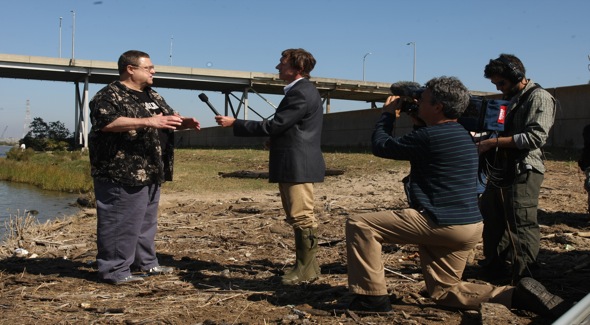I don’t mean to keep returning to The Wire in order to interpret Treme, but it’s proven helpful so far. We have five seasons of The Wire, 50 hours of television over six years, to act as a Talmud to the five scant hours of Treme. So let’s use The Wire as our text.
After a few hours on the streets of Baltimore, you’ll see a dozen lives get ground up in the bureaucracy and brutality of the War on Drugs. Wallace, Omar’s boy Brandon, Stinkum, Gant, D’angelo, the Sobotkas, those fiends in the lockup that Avon gave the hot shots to … and that’s just the first two seasons. You might start wondering, “If keeping drugs illegal causes all this strife, why not legalize drugs?” Major Colvin tries just that in Season 3, pushing all the dealers in his district to an abandoned block of houses and telling them he’ll turn a blind eye to anything they sell in there. Anyone who sells outside of “Hamsterdam” gets busted, hard. Anyone who shoots up “Hamsterdam” gets busted harder. Just stay within the lines and sell your shit and everything will be cool.
What’s the result?
http://www.youtube.com/watch?v=_9tuxxkgFME
In Season 4, a professor from Hopkins gets the idea to take a few kids out of Baltimore’s high schools. He’d work with them in small seminars instead of crowded classes. Through interviews and exercises, he’d get at the root of their anti-social behavior. In time, and with the proper funding, he could hopefully devise a curriculum that would get them out of the generational cycles of crime and poverty.
Fortunately, he ran into Major Colvin, who talked him into picking kids a little younger. Otherwise, every interview would have gone like this:
http://www.youtube.com/watch?v=WDIi0dzmvpE
(Sorry for the laugh track; this is the only version of this clip I could find. Somehow the laughter seems appropriate)
When Mayor Carcetti sweeps into office (Season 4), he has a bold series of inspiring plans. On his first day, he galvanizes the traffic and sanitation departments into action with a series of crafty “constituent complaints.” He tours the police department; disappointed by their malaise, he promises swift changes. Then he learns just how bad the school’s budgets are. He can’t – rather, won’t – go to the governor for help, so he has to rummage through the police budget to make up for it.
And this is a short list. Consider McNulty’s plan to free up some money for the police department in Season 5. Or Stringer’s plan to make the drug business in Baltimore peaceful through a co-op of like-minded businessmen. Nobody’s well-laid plans go very far. Even if they can cut through the red tape of one institution with a lateral move, another institution – the DEA, the Governor’s office, or the simple force of greed – can strangle them with the remainder.
If The Wire had one lesson, it’s that Not Everything You Call “Help” Helps.

But my intentions were good! Does that count?
Now let’s reconsider the types of help that have been offered in Treme:
-
Playing for tourists on Bourbon Street. Tourism will pour money into New Orleans and that usually helps. But tourists only pay for certain things: safe restaurants, hotels with modern conveniences and a limited variety of museums. They don’t pay for poor kids to learn music so they can march the second line. And that (as Davis McAlary points out in Episode 5) is where the heart of New Orleans music comes from.
-
Gutting water-damaged houses. Ripping out the interior of a house is a quick and cheap way to make it livable, especially if you have volunteer labor. But, as Chief Lambreaux points out in Episode 2, not every water-damaged house needs to be gutted. A lot of those old houses, built with solid plaster, have stood through storms for a century. And antebellum architecture is another one of New Orleans unique traits.
-
And finally, the Katrina Tours. You might defend these as raising awareness of the poverty of the Ninth Ward. But any such awareness will be superficial and short-lived. And awareness without a follow-up plan doesn’t do much good. You can see the blocks and blocks of ravaged homes and say, “Oh, how terrible.” But who would you give money to? The Red Cross? Habitat for Humanity? Levees.org? Where will your money do the most good?

The problems that affect New Orleans in Treme, just like the problems that afflict the Recon Marines in Generation Kill or Baltimore in The Wire, are institutional in nature. New Orleans is a city of quirks, grown up like kudzu and ossified into a culture. Institutions don’t handle quirks well, however; they prefer uniformity. But it’s not because these institutions – FEMA or the Department of Corrections or the big insurance companies – are malicious. An institution is not ten people conspiring to do evil. It’s ten thousand people with no incentive to do good.
And if Simon and Overmyer have tried to teach us anything, it’s that you can’t play within the institution and expect to get different results. Bringing tourists back to New Orleans won’t create an agency that’s accountable for the levees. Playing a few benefit concerts won’t end the generational mistrust between rich and poor. Marching in a second line won’t stop people from shooting each other. Not Everything That You Call “Help” Helps.
So what is to be done? How does New Orleans rebuild?

So, is it just me, or was John Goodman’s youtube video nowhere near energetic or profane enough to have gone viral? I mean, lord knows it wouldn’t be the first not-that-funny rant to capture the popular imagination for some reason, but given what the actor is capable of, and given some of the great rants that have been written over the years it was pretty damn weaksauce.
“An institution is not ten people conspiring to do evil. It’s ten thousand people with no incentive to do good.”
Love that line. Am stealing it. So I’ll here proffer an advance apology.
@stokes: I read that rant a bit differently. It was definitely a bit tin-eared, but that seemed purposive on Simon’s part. He (Bernette, not Goodman) was trying to constrain his energy in order to appear reasonable and get his message out, but then is so passionate about the subject he couldn’t resist getting carried away.
Pair that with his wife storming around the house at the end and I tend to think Simon is trying to illustrate how telling the truth and being passionate about a marginalized opinion makes you kinda crazy and crackpottish; not only seeming so to mainstreamers watching you on TV, but also in the actual privacy of your own home.
As someone who’s spent a lot of time around social justice activists, it really rang true because of, not in spite of, its tin-earedness. If it had been polished and not played with just that smidgen of self-consciousness by Goodman, it would have veered into cartoony Coens territory.
Spot on though, Perich. I think the main thing with the authenticity issue is that for this work, it’s an issue for Simon. He’s got cred in Baltimore, but not so in NO. So that’s clearly something he was gonna observe and be conflicted by when he went down there to research. And unlike Baltimore, even though I’ve only been to NO once, it seems credible that “authenticity” is a live issue there with a lot of conflicting opinions and emotions about it. So why not put it on display?
Folks that feel the show is bossing them around instead of just showing them a social dynamic doth protest too much methinks.
@stokes: we don’t know how “viral” the video is outside of New Orleans. All we’ve seen are strangers in New Orleans – and apparently Roy effing Blount! – remarking on it.
@bregman: thank you! Please spread it around; I hope the line sees some use. And that’s some good insight regarding the weirdness of the obsessed.
@perich – do things go viral locally on youtube? I’ve never heard of that happening, but then, what I don’t know about youtube could fill a book.
@bregman – I can see how the rant is true to the character. What I object to is the idea that it would get him free cups of coffee. If they wanted to make the guy a folk hero, they could have made him a slightly different character (slightly less realistic, slightly more awesome, slightly more Omar-ish) and given him a more impressive rant.
The second speech he gave was better, mind you – and suggests that, now that he realizes people actually watch the things, he’s putting in a lot more effort. And that lines up nicely with your theory that the writers wanted the first speech to be less good.
I’m a little bit bugged by how much telling-not-showing happens in Treme. I’m still enjoying it, but there seems to be just a crap ton of expositional dialogue. Consider the second line in the most recent episode – in what looks like a pretty joyous moment on Melissa Leo + John Goodman’s faces, their dialogue is just the worst (not to mention that they hug like pals not spouses). It’s like, “The cops are spooked by the size of the crowd but everybody seems to be having a good time.” “Yes, we really need this – there hasn’t been an event like this since the storm.” I pulled this out as an example, but the show is just lousy with exchanges like that. Still, I’m having a good time – where’s Bourbon St. again?
Isn’t “Creighton Burnette” just a perfect name for a Southern writer? (Wendell Pierce is also a good one). But BTW, Carol Burnett’s middle name is Creighton. Her full name is Carol Creighton Burnett. So John Goodman’s characters has almost the same name as Carol Burnett. Why has the master pointed to the famous comedienne with this name?
@Ezra: Interesting bit of trivia! That may find its way into the next installment (with accreditation, natch). ;)